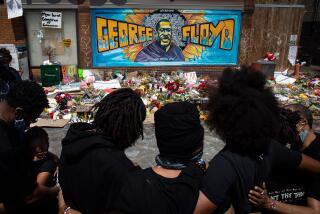Mourning a Reporter Unafraid to Speak Out
- Share via
Wrapped inside the words of remembrance, the bittersweet laughter, the silent tears, lies a need as deep as their grief.
Grief is personal, resolved in quiet moments after the service is over and the farewells uttered.
But this need--the need for voices that shout rather than whisper, for those who prod rather than touch lightly--afflicts an entire community and cries out for collective concern.
In celebrating the life of reporter Dennis Schatzman, this community made its need undeniably clear--and its appreciation.
“We need to raise up more men like Dennis,” said the Rev. L. Craig Hays, speaking Friday at a memorial service for Schatzman. “We need young men like him, of that quality and that character.”
Schatzman, a reporter and syndicated columnist who attracted national attention during his coverage of the O.J. Simpson criminal trial, died July 16 of respiratory problems. He was 47.
The white media “did their best to try to overlook” the racial aspects of the case, Schatzman wrote in the Los Angeles Sentinel, a black weekly newspaper. He was credited with being the first to write about the story’s racial implications.
His funeral at the Angelus Funeral Home in the Crenshaw district drew a vast array of mourners, from journalists and community people to the celebrity figures he wrote about--including O.J. Simpson and defense attorney Carl Douglas.
Those who spoke remembered Schatzman as a straight-talker, a reporter who saw no conflict in possessing passion and concern, one who doggedly raised thorny issues.
As much as he comforted some with his reporting, he outraged others. And there were those who found it difficult to remain angry at him.
“I remember arguing with Dennis about stories,” said Assemblyman Roderick Wright (D-Los Angeles). “Sometimes he’d get it right, and sometimes he didn’t. And if he didn’t, he’d say: ‘Oh, well.’ ”
The Rev. O. Cliff Brazil spoke of Schatzman’s heart. “He cared about his people, and he wrote about his people with a passion,” Brazil said.
Said Oakland attorney John Burris: “He agitated. He agitated. He agitated. In many ways he proved to us that age-old adage, ‘The pen is mightier than the sword.’ ”
And whether they agreed with Schatzman or not, many at the service spoke of their respect for his passion.
Marshall Lowe, managing editor of the Sentinel, recalled testy editing sessions.
“He held his ground,” Lowe said. “And usually somewhere along the line, we let him have his way.”
Schatzman’s syndicated coverage of the Simpson trial attracted readers across the country. He emerged, in the eyes of some, as a Simpson advocate and sympathizer. In the eyes of others, he was a reporter who raised questions they had asked themselves about race and law and the criminal justice system.
Douglas called him “one of the brighter voices” on the trial.
“He was always willing to challenge the official view,” he said.
Often Schatzman’s columns said what others wanted to say. His name, the legacy of his German-Jewish grandfather, sometimes confused readers like Wilbert Tatum, publisher of the Amsterdam News, New York City’s oldest African American newspaper.
“[I said] what is this Jewish white man doing writing this stuff,” Tatum said, drawing laughter as he recalled his introduction to Schatzman’s work. “It’s something I wanted to say. But now that a white Jewish man has said it, it’s just fine.”
When he was not reporting, Schatzman worked at the California chapter of the Congress of Racial Equality, headquartered in the Los Angeles offices of veteran bail bondsman Celes King III.
“We met about once a week and had our usual argument,” said King, 74. “I was looking from one perspective, and he was looking from a more pure perspective. The loss of Dennis Schatzman is a major loss to all of urban America.”
Born and raised in Pittsburgh, Schatzman’s life was an eclectic mix of journalism, politics and law.
For three years, he served as a District Court judge for the city of Pittsburgh. Later, he was appointed Pittsburgh city controller.
But journalism had always been his passion, particularly the black press, and ultimately he returned to his first love. Schatzman worked at the Baltimore Afro-American, was city editor of the New Pittsburgh Courier and managing editor of the Winston-Salem (N.C.) Chronicle.
“He left [the bench] and picked up a press pass and a pen, and he was at home in journalism,” Hays said. “If I was going to be a writer, I would study his style.
“I would copy him. . . . You know it had to be God-inspired. It couldn’t be any other way.”
Those who spoke remembered not only the stories he wrote, his loud laughter and his dogged determination. They also spoke of his willingness to mentor young journalists and of his spirituality. Faith was, by all accounts, as much a part of his being as journalism.
Schatzman knew Scripture, and he often referred to it when called upon to speak, said longtime friend and former colleague James Bolden.
Others recalled his familiar greetings: “It’s a blessed day.”
“The reason Dennis was so successful as a journalist was because he always put God first.”
More to Read
Get the L.A. Times Politics newsletter
Deeply reported insights into legislation, politics and policy from Sacramento, Washington and beyond. In your inbox twice per week.
You may occasionally receive promotional content from the Los Angeles Times.










